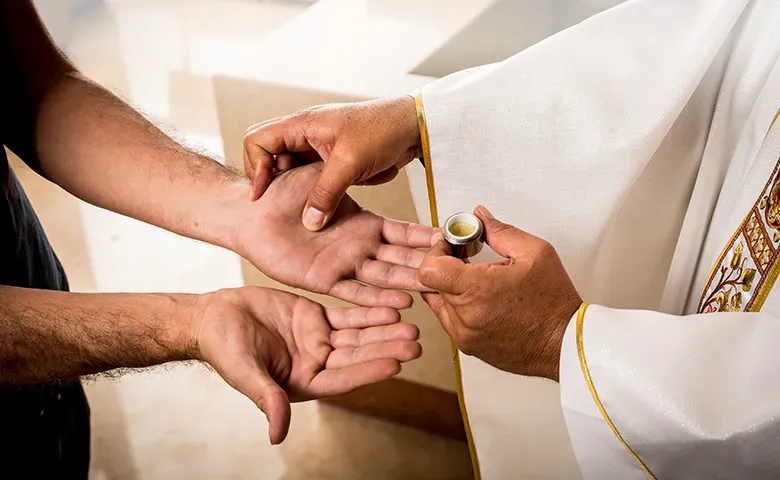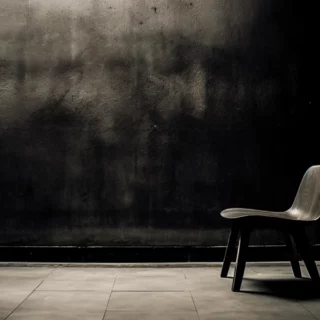

Credopedia
Who can receive anointing of the sick?
The sacrament of the anointing of the sick. Who can receive the anointing of the sick, what does it mean and how does it take place?
Definition
The Anointing of the Sick
Like all sacraments (= signs of salvation), the Anointing of the Sick goes back directly to Jesus and is, along with confession, one of two “sacraments of healing and restoration, in which we are freed from sin and strengthened in our physical and spiritual weakness.” (YOUCAT 224) “Through the Anointing of the Sick, Christ heals, strengthens, and consoles.” (YOUCAT 193) God wants us “to become well in body and soul and, therefore, to believe and to acknowledge the coming of God’s kingdom.” (YOUCAT 241) The sacrament of the Anointing of the Sick can be received “by any Catholic whose health is in a critical state.” (YOUCAT 243)
What does the Holy Bible say?
If Jesus has a special relationship with a group of people, it is with the sick. It is mutual love, for throughout the New Testament it is precisely the sick who seek the closeness of Jesus: “Everyone in the crowd sought to touch him because power came forth from him and healed them all.” (Lk 6,19) Jesus’ whole mission is healing, whereby the symbolic healing of bodily diseases takes a back seat to the spiritual healing through the forgiveness of sins: “When Jesus saw their faith, he said to the paralytic, ‘Child, your sins are forgiven.’ … ‘I say to you, rise, pick up your mat, and go home.’” (Mk 2,5.11) So Jesus turns especially to sinners: “Those who are well do not need a physician, but the sick do. I did not come to call the righteous but sinners.” (Mk 2,17) Jesus heals by becoming a suffering person himself: “When it was evening, they brought him many who were possessed by demons, and he drove out the spirits by a word and cured all the sick, to fulfill what had been said by Isaiah the prophet: ’He took away our infirmities and bore our diseases.’” (Mt 8,16-17) Jesus also commissions his disciples — and here we find the “anointing” of the sick, which Jesus probably did himself: “They drove out many demons, and they anointed with oil many who were sick and cured them.” (Mk 6,13) The Anointing of the Sick is already firmly established in the early Church: “Is anyone among you sick? He should summon the presbyters of the church, and they should pray over him and anoint (him) with oil in the name of the Lord, and the prayer of faith will save the sick person, and the Lord will raise him up. If he has committed any sins, he will be forgiven.” (Jam 5,14f)
A short YOUCAT-Catechesis
Fit for Fight
The Anointing of the sick is not a hollow sign. As is the case with every sacrament, so also here the whole Church guarantees that behind the holy sign stands the power of an invisible divine action. The Church assures us: the sacrament you are now receiving causes a deep change that is indicated by its outward signs. The sign of this sacrament is the anointing. Now, we modern people do not understand very well what an “anointing” is all about. Two terms are most important. 1. protection and 2. power transmission. Let’s start with protection!
Protection I: The wisdom of the ancient shepherds
Some say that the protective custom of anointing goes back to the wisdom of the ancient shepherds. Vermin used to nest in the fur of the sheep. The little critters could also infest the heads of the sheep and enter the auditory canal — a deadly danger for the lambs. The shepherds, therefore, doused their heads with olive oil. This prevented the penetration of vermin — the insects slipped off. For the sacrament of the Anointing of the Sick, this means: “evil cannot penetrate me.” And so, one might understand better that in the Anointing of the Sick, the sensory organs – including the ears — are anointed. “Thus, faith comes from what is heard.” (cf. Rom 10,17) You are in need, so how important it is that you can hear right now. God will hat your auditory canals remain open. No poison may now penetrate you, settle in you and wreak its destructive effect. The healing Word of God will reach you deep inside and give you peace.
Protection II: Escaping the stranglehold
In ancient times, when men competed in the arena, they rubbed themselves with olive oil. This is still the case today — in Turkey, at the oil wrestling match. There is a very simple explanation for this custom: the opponent is less able to get a grip. His hands slip off, and even if you are in a stranglehold, you may still manage to slip away.
Illness can also trap people in a stranglehold. Apparently, nothing protects them from their final end. Day after day, their strength decreases. One is no longer in control of oneself and has to watch how things seem to go only downhill. The battle is almost impossible to win. In fact, Christians believe that there is one — and only one — way to escape the stranglehold of death: union with Jesus, who is unharmed by the great corrupter. In YOUCAT 245 it says: “The Anointing of the Sick imparts consolation, peace, and strength and unites the sick person, in his precarious situation and his sufferings, with Christ in a profound way. For the Lord experienced our fears and bore our pains in his body. For many people, the Anointing of the Sick brings about physical healing. But if God should decide to call someone home to himself, he gives him in the Anointing of the Sick the strength for all the physical and spiritual battles on his final journey. In any case, the Anointing of the Sick has the effect of forgiving sins.”
Royal power transmission
Not only in the Holy Scriptures but all across ancient times, we encounter the anointing, for kings were anointed everywhere. We no longer fully understand what people saw (or should see) in such an “anointing.” Emperors staged themselves as gods, as if in the anointing they were given a power coming from God. We would say today that they were given power in a more or less democratic way, which they so often cruelly abused. Jesus loved to express himself and his message in material things: in bread, wine, salt and leaven, we find “him” again. He also takes up the “anointing”— yes, in the Gospel of Luke he begins his work in this sign: “The Spirit of the Lord is upon me, because he has anointed me.” (Lk 4,18) Jesus also allows a woman to break “an alabaster jar of perfumed oil” (Mk 14,3) and pour it over his head. The strongest of Jesus’ titles was “Christ” — this is Greek and means “the Anointed One.” The whole hope of Israel was directed towards the coming of the Anointed One — in Hebrew, “the Messiah.” In the midst of persecution, the first Christians are proud of nothing more than being in communion with Jesus. Peter and John were persecuted and thrown into prison, and they could not understand how one could rage “against your holy servant Jesus” who was obviously persecuted and “anointed” (Acts 4,27) by God. It becomes clear that the anointing consists of the transmission of force. And this power is not something vaguely divine: it is the Holy Spirit. And this Holy Spirit is not an exclusive possession of Jesus. Paul says: “But the one who gives us security with you in Christ and who anointed us is God.” (2 Cor 1,21)
I need your anointing!
There is a wonderful story from early Christianity. Ignatius of Antioch was the third bishop of that Turkish city which is now called Antakya. It is said that Peter himself (!) made him a bishop. Around the year 107, Emperor Trajan had this venerable man kidnapped and brought to Rome to the lions. 2100 km as the crow flies — a long journey to certain death! On this farewell tour of life, the aged bishop found time to write seven letters to seven parishes, which are among the most beautiful documents of the early Church. In them, Ignatius gives no age-old advice and does not pretend “… as if I were something. For though I wear fetters for the sake of the name, I am not yet perfect in Jesus Christ. For I am only now beginning the discipleship of Christ and speak to you as to my fellow disciples.” And in this heartfelt way Ignatius has a last wish for the Christians of Ephesus: “From you I had to be anointed to fight by faith, encouragement, patience and long-suffering.” Even if Ignatius perhaps did not formally receive the sacrament of the Anointing of the Sick, I am sure that the anointing by the Holy Spirit was on Ignatius when the door of the arena in Rome was opened and the aged bishop was pushed before the lions. In YOUCAT 173 it says: “Through the Anointing of the Sick the despairing become people of confidence. The sacrament in all the sacraments is Christ himself. In him we men, lost in selfishness, grow and mature into the true life that has no end.”

YOUCAT Digital
Discover our digital products, which will help you to grow in faith and become missionaries yourself.







